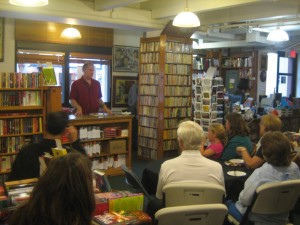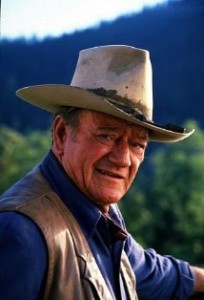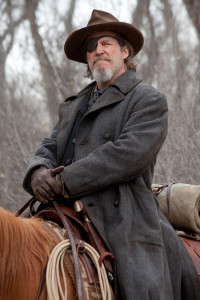By John Gilstrap
I’m embarrassed to admit that we are a ten-television family. It’s even more embarrassing that we are a household of two—just my wife and I, effective tomorrow when my baby boy moves into his own apartment. (Technically, since he’s still in the house today, we are an eleven-television family.)
The MOAT (Mother Of All Televisions) is in our movie room. It’s a 106-inch hi-def front projection wonder with a sound system that could do structural damage to the house if I cranked it up loudly enough. It’s the ultimate man-cave that all too often is pressed into service for the screening of chick flicks. Hey, a deal’s a deal. When I consider what I no longer pay to go to a theater, I figure the movie room might just pay for itself one day.
While there’s a certain utility to the MOAT, the pure luxury of a television is the little flat screen we have mounted in the master bathroom. Make fun if you’d like, but it’s nice to do the morning chores with the morning news in the background.
Ours is a three-bedroom house, and we enjoy entertaining guests, so it only makes sense that each bedroom would have its own television. Then there’s one in my office and the one in my wife’s office. It’s nice to watch TV while cooking and cleaning, so there’s a tiny TV in the kitchen, as well.
When we built the house, our son was still in high school, so we wanted to have a place for him and his friends to hang out, so there’s a television in the downstairs family room. When all is said and done, though, the upstairs family room television gets the most use for routine weeknight viewings of network shows.
See how quickly it adds up? You’d think that that Mars/Venus tug of war on program selection would be a snap. Lord knows we have a lot of options. So, when I want to watch Military Channel and Joy wants to watch HGTV, there should be no controversy. She should watch her programs on one TV and I should watch mine on another.
That logic ignores the complication that after 26 years of marriage, we still like each other and prefer to be together instead of being in different parts of the house. Given our day jobs and my night job of writing books, we spend enough time apart, thank you very much. It’s nice to snuggle up on the couch to watch TV together.
Unless . . .
Well, there’s the rub. The unlesses, I mean. At the deepest levels of my soul, I give not a flying fig what Kate is doing with her Eight, and I’d rather put a fork in my eye than watch another episode of any hospital drama ever to be produced between now and the end of the millennium. Ditto Joy’s feelings toward R. Lee Ermy (one of my top five picks of people I’d like to have dinner with), the latest design of weaponry or colorized footage of World War Two battles.
The good news is that the dark days of choices are behind us now that it’s January and some of our shared favorites have returned. Here are our shared favorites, in no particular order:
American Idol
The Middle
Modern Family
The Big Bang Theory
Two and a Half Men (though this one is kind of on probation; it might have outlived its storyline)
Blue Bloods
Pawn Stars
American Pickers (I’m less an enthusiast than she)
Castle (also on probation, though getting better)
So You Think You Can Dance (okay, technically this is not on yet, but it’s essentially a continuum with American Idol)
I’m sure there are more, but those are the biggies.
How about you, Killzoners? What programs do you and your significant other share as favorites to be watched together?






